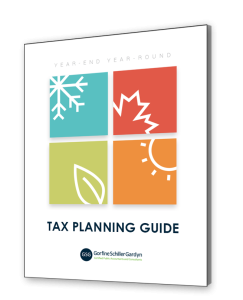Several laws passed during 2015 created new rules that will affect your 2016 tax returns. Here’s an overview.
New Due Dates
Form 990. The initial due date for the return filed by nonprofit organizations, Form 990, Return of Organization Exempt From Income Tax, remains unchanged (May 15 for calendar year nonprofits). However, beginning with 2016 returns, nonprofits can request an automatic six-month filing extension (to November 15). Prior to the change, nonprofits had to file for a 90-day extension and then request an additional three months.
Form 1065. Beginning with 2016 returns, the initial due date for calendar year partnerships to file Form 1065, U.S. Return of Partnership Income, is March 15. The extended due date remains September 15. Fiscal year partnerships are required to file by the 15th day of the 3rd month after year-end, and can request a six-month extension of time to file.
Form 1120. Calendar year corporations have an initial due date of April 15, beginning with 2016 returns. The extended due date for calendar year returns remains September 15. Corporations with fiscal year ends other than December 31 or June 30 are required to file by the 15th day of the 4th month after year-end, and can request a five-month extension. These changes do not go into effect until the 2026 tax year for C corporations with a June 30 fiscal year-end.
Form 1041. The initial due date for trusts and estates filing Form 1041, U.S. Income Tax Return for Estates and Trusts, remains unchanged (April 15 for calendar year entities). Beginning with 2016 returns, the extended due date is September 30 (formerly September 15).
FinCen Report 114. The due date for the Foreign Bank and Financial Accounts Report is April 15, starting with returns due for calendar year 2016. New rules also allow for an extension until October 15. Before the change, the report was due June 30, and no extension was available.
Form W-2. Employers must file Form W-2, Wage and Tax Statement, with the Social Security Administration by January 31. The new due date applies whether the forms are filed electronically or on paper, and extensions for filing are no longer automatic. The due date for giving Form W-2 to employees remains January 31.
Form 1099-MISC. Miscellaneous income information returns that report nonemployee compensation payments in box 7 are due to the IRS no later than January 31. The due dates have not changed for other Forms 1099 (February 28 for paper copies and March 31 for electronic filing). The due dates for providing Form 1099 to the payee remains the same.
Note: Due dates for other forms, such as Form 1120S, U.S. Income Tax Return for an S corporation, and Form 1040, U.S. Individual Income Tax Return, have not changed. The extended due date for Form 5500, Annual Return/Report of Employee Benefit Plan, was changed, but the change was later repealed, and the extended due date remains October 15. For information about due dates for other returns, please contact us.
New Penalty Relief
Expanded exception to early withdrawal penalty for public service workers. Generally, withdrawals taken from a qualified retirement plan before age 59½ are subject to a 10% early withdrawal penalty in addition to the income tax due on the distribution. There is an exception to the 10% penalty for public service employees such as police officers and medics who retire or otherwise “separate from service” during or after the calendar year in which age 50 is reached. Beginning with 2016 distributions, the exception for public service employees is expanded to include specified federal law enforcement officers, customs and border protection officers, federal firefighters, and air traffic controllers. In addition, an exemption is now allowed for distributions from defined contribution plans or other types of governmental plans, such as the Thrift Savings Plan.
Penalty safe harbor for certain information returns. Beginning with returns filed for the 2016 tax year, a safe harbor provision is available for certain information returns, including Form W-2, Wage and Tax Statement, and Forms 1099. The penalty for failure to file a correct return will not apply when the return provided to the IRS and/or the payee is otherwise correct but includes an error of less than $100 for any single amount. In addition, the form does not need to be corrected. The threshold is $25 for errors related to withholding or backup withholding. The safe harbor provision does not apply if the payee requests a corrected statement.
New Documentation Requirements
Form 1098-T required to claim education tax incentives. Beginning in 2016, a taxpayer must have Form 1098-T, Tuition Statement, from a qualified education institution in order to claim education tax benefits such as the American Opportunity tax credit, the Lifetime Learning credit, and the tuition and fees deduction. In addition, Form 1098-T will only include qualified tuition and related expenses actually paid.
Consistent basis reporting for estates. Executors of estates that are required to file tax returns with due dates after July 31, 2015, must file Form 8971, Information Regarding Beneficiaries Acquiring Property From a Decedent, and the related Schedule A, with the IRS. Schedule A (but not Form 8971) must also be given to the applicable estate beneficiary. Form 8971 identifies the value of inherited property, and must be filed within 30 days after the estate return is filed or 30 days after the due date of the estate return, whichever is earlier.
ABLE account information returns. The Achieving a Better Life Experience (ABLE) Act created tax-favored savings accounts for individuals with disabilities, and added new reporting requirements for account trustees. Account holders will receive Form 5498-QA, ABLE Account Contribution Information, when an ABLE account is established, and Form 1099-QA, Distributions from ABLE Accounts, when distributions are made or an account is terminated.
Categories: Tax, Tax Planning




